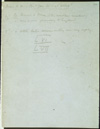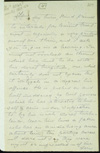Mahatma Letter No. 102
| Quick Facts | |
|---|---|
| People involved | |
| Written by: | Koot Hoomi |
| Received by: | A. P. Sinnett |
| Sent via: | unknown |
| Dates | |
| Written on: | unknown |
| Received on: | January 1883 |
| Other dates: | none |
| Places | |
| Sent from: | unknown |
| Received at: | Allahabad, India |
| Via: | none |
This is Letter No. 56 in Barker numbering. See below for Context and background.
< Prev letter chrono
Next letter chrono >
< Prev letter Barker
Next letter Barker >
Cover sheet
|
From K.H. — Rec. Jan. 83 Allah[abad]. |
NOTES: |
Page 1 transcription, image, and notes
|
It is my turn, kind friend, to intercede for lenient treatment, especially a very prudent one of Mr. Hume, and I ask you to give me a hearing. You must not overlook an element which has much to do with his moral turpitude, one, which certainly does not excuse though it mitigates in a degree, his offence. He is pushed on and half maddened by evil powers, which he has attracted to himself and come under subjection to by his innate moral turbulence. Near him lives a fakir who has an animalizing aura about him; the parting curses — I dare not say they were unjust or unprovoked — of Mr. Fern |
NOTES: |
Page 2
|
have produced their effect; and while his own self-painted adeptship is entirely imaginary, he has nevertheless, by the injudicious practice of pranayam, developed in himself to some extent mediumship — is tainted for life with it. He has opened wide the door to influences from the wrong quarter, and is, henceforth almost impervious to those from the right. So, he must not be sweepingly judged as one who has sinned with thorough and entirely unmixed deliberation. Avoid him, but do not madden him still more, for he is more than dangerous now, to one, who is unable like your |
|
NOTES: |
Page 3
|
self, to fight him with his own weapons. Suffice that you should know him — as he is, and so be forewarned and prudent in future, since for the present he has succeeded in spoiling our plans in the most hopeful quarters. He is now in his days — which will extend for weeks and perhaps months — of the most selfish vanity and combativeness — during which he is capable of doing most desperate things. So, think twice, my good friend before you precipitate a crisis the results of which might thus be very severe. As regards his connection with Theosophical |
|
NOTES: |
Page 4
|
matters, he is largely your chela, the captive of your spear and bow; but, since you have thus acted under my own instructions — I take the blame upon myself — the whole blame, understand me well; and I would not allow a single speck of the present disastrous results to taint your Karma. But the latter is a thing of the future, and in the meanwhile he can play the deuce with yourself and Society. It cost you no little trouble to get him in and now you must beware how you prematurely hurl him out. For, you have seen from his correspondence, what malice |
|
NOTES: |
Page 5 - right
|
he is capable of, and how industriously he can work to breed suspicion and discontent so as to centre interest and loyalty upon himself. The T.S. has just tided safely through a tempest raised by another vain and ambitious malcontent — Dayanand S. — and if the issue has been favourable it is because D.S. had a short memory and was made to forget all about the documents he had issued. It is the prudent part, therefore, to wait, and watch, and lay by the materials for the defence against the time when this new iconoclast shall "charge upon your entrenchments" — i |
|
NOTES: |
Page 5 - left
|
if he ever does, which up to this moment, is not determined, but which would be almost inevitable if he were suddenly denounced by yourself. I do not ask you to evince friendship for him, (nay, I would strongly advise you not to even write to him yourself for some time to come, and when pressed for an explanation, ask your good lady of whom he is afraid and whom he is forced to respect to tell him bluntly and honestly the truth — in a way only women are capable of) — but simply to postpone an open breach until the hour comes when longer delay would be unpardonable. Neither of us ought to imperil a cause |
|
NOTES: |
Page 6 - right
|
whose promotion is a duty paramount to considerations of Self. I must not close my letter with this black image, but tell you that in Madras there are fairer prospects of success than at Calcutta. In a few days you will hear the results of Subba Row's work. How do you like "Mr. Isaacs"? As you will see (for you must read and review it) the book is the Western echo of the Anglo-Indian "Occult world." The ex-editor of the "Indian Herald" has not quite grown up to the size of the editor of the Pioneer, but |
|
NOTES:
|
Page 6 - left
|
is being done in the same direction. The cruel enemy of 1880-1 is turned in quasi an admirer in 1882. I think it rather hard to see people finding K.H. "Lal Singh" — mirrored in "Ram Lal" — the "all-grey" adept, of Mr. Marion Crawford. Had the book been written a year ago, I might have said the author was himself gris when making "Ram Lal" talk of eternal love and bliss in the realms of the world of Spirit. But since a certain vision procured for him by the famous "Ski" in whom Mr. C. C. M. does not believe — the man gave up entirely drinking. One man more saved. I forgive him my very "grey" appearance and even Shere-Ali! Yours affectionately, K. H. |
|
NOTES: |
Context and background
Physical description of letter
The original is in the British Library, Folio 3. George Linton and Virginia Hanson described the letter in this way:
KH script on two folded sheets of heavy white paper, about 4" X 7" [10.2 X 17.8 cm], on both sides, fine lettering in dull blue ink.[1]
Publication history
Commentary about this letter
Notes
- ↑ George E. Linton and Virginia Hanson, eds., Readers Guide to The Mahatma Letters to A. P. Sinnett (Adyar, Chennai, India: Theosophical Publishing House, 1972), 168.







